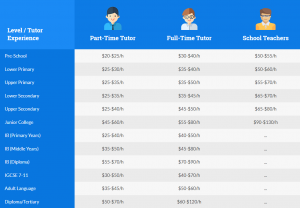
Here’s asking: How old should I be to sign up as a tutor?
But hey, it’s normal! It’s common to see youths like yourself seeking independence, looking for part-time jobs in order to earn a little bit of pocket money.
When it comes to a role that tackles communication, academics and a whole bunch of empathy, it can be slightly daunting to even find out if you have what it takes to be a tutor.
Worry not, we’re here to answer everything! Nice, and simple.
Why Become a Tutor?

[Freepik]
Here’s the scenario: You’re just fresh out of O-levels. You’re good at studies, and you wanna’ translate that into some kind of teaching expertise. Perhaps tutoring as a side job?
From what others have said, polytechnic days seem to be rather carefree. You could probably manage it, while the study material is still fresh in your head!
While earning some pocket money is good on the side, there’s also the saying that “teaching others is the best way to learn”. With the protégé effect of understanding material again through teaching others, you’ll be able to maintain your smarts as you advance a level in your education!
Common Questions First!
Before we move on to the specifics, we’ll clarify some common doubts first.
Is There a Minimum Age?

[Freepik]
Well yes. But as long as you’re well underway in secondary education, you can in theory begin your career as a tutor! For the specifics, our Ministry of Manpower mandates that the earliest working age is 13. But it is a society standard that most agencies like SmileTutor only assign tutors that are at least secondary school graduates, meaning you’re at least 16 years old.
What Qualifications Do I Need to Have?
Age is a thing, but really, qualifications carry your identity as a trustworthy teacher. Especially when you’re on the younger side, credentials matter so much more!
Whether you’ve aced your O-Level, or you’re on the higher end as an A-Level graduate, hiring agencies and parents will look through your ‘resume’ to ensure that you’re good enough!
How Much Should I Charge?
So, the more important question comes around. How much should you charge? What is the market rate for a junior tutor like yourself? Let’s take SmileTutor as a metric:

Of course, only use this as a rough estimate, as past work experience, agency fees and many other considerations like your personal expenses will be factored in.
Nevertheless, $20 would be the average, as of the time writing this article. A redditor on “r/SGExams” commented on their experience as a tutor: “I started with a measly $18/hour for my first assignment (all my subsequent assignments are $30/hour and up though).”
Evaluate yourself fairly after your first lesson, and assess yourself based on your client’s satisfaction for your work. Of course, make sure not to overdo it! With a higher payout, comes greater expectations.
What Type of Students Should I Take In?

[Freepik]
This is a rather tricky question to answer, because this is mostly not within your control. Ideally, all of us want to teach clever students so you’d only be lending the minimal amount of effort to help out for easy money. But since you’re mostly on the receiving end of the transaction, you’ll only know what your assignment is after you’ve been contacted for a lesson.
The more specific question you should ask is: “What level of students should I teach?” or “What subjects should I teach?”
It shouldn’t come as surprising, but always teach subjects that you’re confident and good at. If you’re good, you can teach a grade lower. But a more comfortable position would be to teach an entire level lower, so a secondary school graduate would be teaching a primary school student.
Is Tutoring Really Viable as Part-Time Work?

[Freepik]
It can be easy to feel a little discouraged when most other youngsters your age choose to take familiar routes like retail, an F&B crew or an event personnel. And here you are, agonising over your rather… peculiar choice of work.
For sure, the ones you’ve heard of are often beginner-friendly and do not require much to get started as compared to tutoring. The job always hinges on demand, and naturally, your personal ability to help your students.
To that, we say: It doesn’t hurt to give it a try, so why not? Here in Singapore, a license or certification of any kind isn’t required to land you a spot as a private tutor. Well, unless you count your O’s and A’s!
Under the scrutinising eyes of parents, you’ll want the things expected of you; have stellar grades, offer low rates for first lessons, good at communication with both parent and student, emphasise patience in teaching… All of which helps to “sell yourself” and leave your clients with a good impression.
How Do I Get Started?

[Freepik]
Ah, of course. The practicality of being a tutor needs to be mentioned before you dive head first into it.
Fundamentally, you have three ways to go about this.
Freelancing (Personal Connections)

[Freepik]
It can come from a neighbour’s request. Or perhaps being introduced by your parents’ colleagues’ children/juniors. Freelancing as a tutor on your own means you’ll have to rely on yourself or your own connections to get the word out!
Private Tutor (Tuition Agency)

The next route would be to approach a tuition agency, whether through a call or in-person, to have your profile recorded in their system.
After your experience and relevant employment details are profiled, you’ll be matchmade according to your preferences of location and lesson type depending on what client is offered at the time.
Agencies usually take an initial cut in exchange for the opportunity, but finding clients will become more effortless. Additionally, successful lessons would also add on to your resume while your profile is active within the agency.
Tuition Centre
Some have also gone through the final method: Approach a tuition centre.
Rather than applying online where client availability is often out of your control, a tuition centre is more stable in their influx of students.
If you successfully apply to a centre, the pay depends on which level you’re tutoring, along with the caveat of having no CPF contribution and deduction since you’re a part-timer!
No need to be shy about your application. The worst they can do is reject your application! But in general, as long as your character and grades are decent, they’ll accept you.
Some have even transitioned from tuition centres back to a private tutor once they’ve racked up enough experience!
A Starting Point

[Freepik]
Age, credibility, experience. It’s a feedback loop that all budding tutors have.
While age can be a concern, we can assure you that you just have to take the FIRST step. It’s never too young to start, and the potential is there for those who want to carve a career out of tutoring! Keep in mind that as a student yourself, you’re exchanging your rest time for the hustle!
And as with every job, competition is inevitable. It’s important to recognize the competitive nature of tutoring (especially private tutoring) and the need to distinguish yourself amidst the abundance of qualified tutors!
Got everything so far? Well then, good luck out there!
